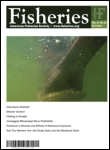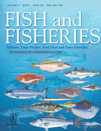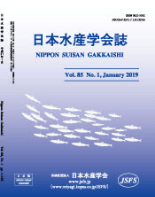
REVIEWS IN FISH BIOLOGY AND FISHERIES
Scope & Guideline
Fostering innovation in aquatic research since 1991.
Introduction
Aims and Scopes
- Fish Biology and Ecology:
Research focusing on the physiological, behavioral, and ecological aspects of fish species, including their adaptations to various environments and ecological interactions. - Fisheries Management and Conservation:
Studies aimed at improving the sustainability and management of fisheries, addressing challenges such as overfishing, habitat degradation, and climate change impacts. - Aquaculture and Stock Enhancement:
Research on practices and technologies in aquaculture, including breeding, genetics, and health management to enhance fish stocks and ensure sustainable production. - Impact of Environmental Changes:
Investigations into how climate change, pollution, and habitat alterations affect fish populations and fisheries, including studies on resilience and adaptation. - Socio-Economic Aspects of Fisheries:
Exploration of the socio-economic dimensions of fisheries, including the livelihoods of fishing communities, market dynamics, and policy implications. - Innovative Research Methodologies:
Development and application of new technologies and methodologies for monitoring and assessing fish populations, such as eDNA, acoustic telemetry, and remote sensing.
Trending and Emerging
- Climate Change Impact Studies:
Research focusing on the effects of climate change on fish populations and fisheries dynamics is increasingly prevalent, addressing urgent issues such as shifting species distributions and ecosystem resilience. - Genomics and Molecular Biology:
An emerging focus on the role of genetics and molecular biology in understanding fish biology, including studies on population genetics, epigenetics, and the implications for conservation and management. - Plastic Pollution and Marine Debris:
Increasing attention is being paid to the impact of plastic pollution on fish health and ecosystems, highlighting the need for strategies to mitigate these effects. - Sustainable Aquaculture Practices:
A growing body of research is dedicated to enhancing the sustainability of aquaculture practices, focusing on breeding techniques, disease management, and environmental impacts. - Interdisciplinary Approaches to Fisheries Management:
Emerging themes emphasize the integration of social, economic, and ecological perspectives in fisheries management, promoting holistic approaches to sustainability. - Citizen Science and Community Engagement:
There is a notable trend towards utilizing citizen science and engaging local communities in fisheries monitoring and management, reflecting a shift towards inclusive research practices.
Declining or Waning
- Traditional Fisheries Practices:
Research on traditional or indigenous fishing practices has diminished, possibly due to a shift towards more modern and sustainable practices and technologies. - Purely Descriptive Studies:
There has been a noted decrease in studies that are purely descriptive in nature, as the journal increasingly favors research that includes analytical or management implications. - Overly Broad Reviews:
Broad reviews that do not focus on specific case studies or actionable insights have become less common, with a trend towards more targeted and detailed analyses. - Historical Fisheries Data Analysis:
Research primarily focused on historical data without contemporary relevance or application has waned, as there is a greater emphasis on current and future challenges in fisheries management.
Similar Journals

AFRICAN JOURNAL OF MARINE SCIENCE
Connecting researchers to Africa's aquatic treasures.AFRICAN JOURNAL OF MARINE SCIENCE is a premier academic journal dedicated to advancing the field of aquatic sciences and ecological studies, published by Taylor & Francis Ltd. Established in 2003 and based in South Africa, this journal provides a vital platform for researchers, professionals, and students interested in the diverse and dynamic marine ecosystems of Africa. With an impressive impact factor reflected in its Q2 quartile ranking in both Aquatic Science and Ecology, Evolution, Behavior and Systematics categories, the journal showcases innovative research that addresses pressing environmental challenges. Open access options facilitate broad dissemination of knowledge, ensuring that cutting-edge findings are accessible to all stakeholders in the marine research community. As it converges towards its impressive milestone year of 2024, the AFRICAN JOURNAL OF MARINE SCIENCE serves as an essential resource for fostering scientific discourse and collaboration across the continent and beyond.

Turkish Journal of Fisheries and Aquatic Sciences
Connecting global minds in fisheries and aquatic research.Turkish Journal of Fisheries and Aquatic Sciences, published by the CENTRAL FISHERIES RESEARCH INST, is a key resource in the fields of Fisheries and Aquatic Sciences, catering to a global community of researchers and professionals. With its ISSN 1303-2712 and E-ISSN 2149-181X, this journal offers an engaging platform for the dissemination of high-quality research from Turkey, covering critical topics within Animal Science and Aquatic Science. As a third quartile journal in both categories (Q3, 2023), it provides valuable insights, contributing to a growing body of literature that addresses aquatic ecosystems, fisheries management, and biodiversity conservation, thereby enhancing the sustainability of aquatic resources. The journal has shown considerable impact, ranking 144th in Animal Science & Zoology and 116th in Aquatic Science within Scopus, reflecting its relevance and credibility within the academic community. Operating from 2008 to 2024, it invites open access submissions to foster collaboration and knowledge sharing among scientists, students, and practitioners alike, reinforcing its dedication to advancing the science of aquatic ecosystems.

FISHERIES
Shaping the future of fisheries through impactful research.FISHERIES, published by WILEY, stands at the forefront of aquatic science and nature conservation, providing a vital platform for researchers and practitioners to share their findings and contribute to the sustainable management of global fishery resources. With an impressive impact factor and recognition within its field, the journal is currently ranked Q2 in both Aquatic Science and Nature and Landscape Conservation categories as of 2023, indicating its significant influence and quality of research dissemination. Covering a broad scope of topics from aquatic ecosystems to conservation strategies, FISHERIES facilitates cross-disciplinary discourse essential for understanding the ecological and socioeconomic aspects of fisheries. As the journal converges its years of operations from 1976 to 2024, it continues to adapt to emerging challenges in the field, making it an invaluable resource for professionals, researchers, and students alike who are dedicated to advancing knowledge and practices in sustainable fisheries management.

ICHTHYOLOGICAL RESEARCH
Pioneering studies for a sustainable aquatic future.Ichthyological Research is a prominent journal in the field of ichthyology, focusing on the biology, ecology, and conservation of fish species and their habitats. Published by Springer Japan KK, this journal has been a significant contributor to aquatic research since its inception in 1996 and will continue to disseminate cutting-edge findings through 2024. With an Impact Factor that places it within Q2 of the Ecology, Evolution, Behavior, and Systematics category, it ranks #318 out of 721 in Scopus, situating it in the 55th percentile of its field. This journal serves as a valuable resource for researchers, professionals, and students, offering open access to vital studies that drive forward our understanding of fish ecology and biodiversity. Located in Tokyo, Japan, Ichthyological Research aims to bridge gaps between theoretical research and practical application, emphasizing the conservation of aquatic ecosystems.

Journal of Fisheries
Empowering research for a thriving aquatic ecosystem.The Journal of Fisheries, an esteemed publication by BDFISH, serves as a pivotal platform for disseminating cutting-edge research in the field of fisheries science. With its commitment to Open Access since 2013, the journal ensures that vital knowledge is accessible to researchers, professionals, and students worldwide, promoting widespread dissemination of fishery-related discoveries. By featuring high-quality peer-reviewed articles, the Journal of Fisheries aims to advance the understanding of aquatic ecosystems, sustainable fishing practices, and the broader implications of fisheries on biodiversity and food security. Located at the Dept of Fisheries, University of Rajshahi, Bangladesh, this journal plays a crucial role in fostering academic dialogue and collaboration, contributing significantly to the growth and development of fisheries research globally.

CANADIAN JOURNAL OF FISHERIES AND AQUATIC SCIENCES
Exploring the depths of fisheries and ecological innovation.The Canadian Journal of Fisheries and Aquatic Sciences, published by Canadian Science Publishing, stands as a premier interdisciplinary journal dedicated to advancing knowledge in the fields of aquatic sciences, ecology, and evolutionary biology. With a longstanding history of publication since 1980, this journal delivers high-quality, peer-reviewed research that contributes to the understanding of aquatic ecosystems and the sustainable management of fisheries. The journal is esteemed for its rigorous standards and currently holds a Q1 ranking in both Aquatic Science and Ecology, Evolution, Behavior, and Systematics as of 2023, evidencing its significant impact in these critical areas. Researchers, professionals, and students alike can expect compelling explorations of both fundamental and applied aspects of aquatic sciences. While the journal offers traditional access, it remains committed to disseminating pivotal research findings to foster a vibrant community of scholars and practitioners striving towards innovative solutions for aquatic environmental challenges.

FISH AND FISHERIES
Empowering researchers to shape sustainable aquatic policies.FISH AND FISHERIES is a premier academic journal published by Wiley, dedicated to advancing knowledge in the fields of aquatic science, ecology, and oceanography. With an impressive impact reflected in its 2023 categorization in the Q1 quartile across multiple disciplines—including Aquatic Science and Management, Monitoring, Policy and Law—it serves as an essential resource for researchers, professionals, and students alike. This journal includes rigorous, peer-reviewed articles that address the multifaceted aspects of fish biology, conservation, and sustainable fisheries management. The journal's Scopus rankings further validate its significance, with top positions in Earth and Planetary Sciences, and its commitment to fostering scientific dialogue in an era where the oceans and aquatic ecosystems face unprecedented challenges. Despite not being an Open Access journal, FISH AND FISHERIES remains a vital platform for innovative research that informs policy and drives stewardship of fish populations and their habitats.

NIPPON SUISAN GAKKAISHI
Fostering Excellence in Fisheries ResearchNIPPON SUISAN GAKKAISHI, published by the Japanese Society of Fisheries Science, is a prestigious journal with a long history dating back to its inaugural issue in 1932. This journal, which spans key contributions to the field of Aquatic Science, serves as a vital platform for the dissemination of important research findings related to fisheries and aquatic biology, fostering knowledge and innovation in Japan and beyond. Although it is not an open-access publication, its rigorous peer-review process ensures the quality and integrity of the articles published. The journal is currently listed in the Q4 category for Aquatic Science according to the 2023 metrics, placing it within a niche but significant corner of the research landscape. With an ISSN of 0021-5392 and E-ISSN of 1349-998X, it continues to provide essential insights that benefit researchers, professionals, and students alike, highlighting advancements and challenges within aquatic ecosystems over a converged year span that continues to evolve through to 2024.

Fishes is a premier academic journal dedicated to the exploration and dissemination of cutting-edge research in the fields of aquatic science and ecology. Published by MDPI in Switzerland, this open-access journal has been accessible to researchers globally since its inception in 2016, allowing for the rapid exchange of knowledge that fosters scientific advancement in the study of fish and aquatic ecosystems. With its convergence in the years 2016 to 2024, Fishes proudly holds a notable position in the academic community, evidenced by its category quartile rankings of Q3 in Aquatic Science and Q2 in Ecology for 2023. The journal consistently features innovative research encompassing ecological interactions, conservation strategies, and evolutionary studies within aquatic environments. By integrating interdisciplinary approaches and encouraging contributions from a diverse array of experts, Fishes serves as an invaluable resource for researchers, professionals, and students alike, contributing to the understanding and preservation of our precious aquatic biodiversity.

FISHERIES MANAGEMENT AND ECOLOGY
Exploring the intersection of ecology and fisheries science.Fisheries Management and Ecology, an esteemed journal published by Wiley, serves as a critical platform for researchers, practitioners, and policymakers in the fields of aquatic science and ecology. With an ISSN of 0969-997X and an E-ISSN of 1365-2400, this journal has been at the forefront of advancing knowledge and best practices in sustainable fisheries management since its inception in 1994. Hailing from the United Kingdom, it has steadily distinguished itself with a respectable impact factor and is currently ranked Q2 in both Aquatic Science and Ecology categories, evidencing its scholarly relevance. The journal not only covers a broad spectrum of topics related to fishery ecology and management, but also emphasizes the importance of interdisciplinary approaches to tackle the myriad challenges facing aquatic ecosystems today. It is indexed in reputable databases and boasts commendable Scopus rankings, making it a valuable resource for anyone invested in the sustainable use of aquatic resources. This commitment to accessibility and engagement, although not open access, ensures that critical research remains a cornerstone for ongoing discussions in the field.